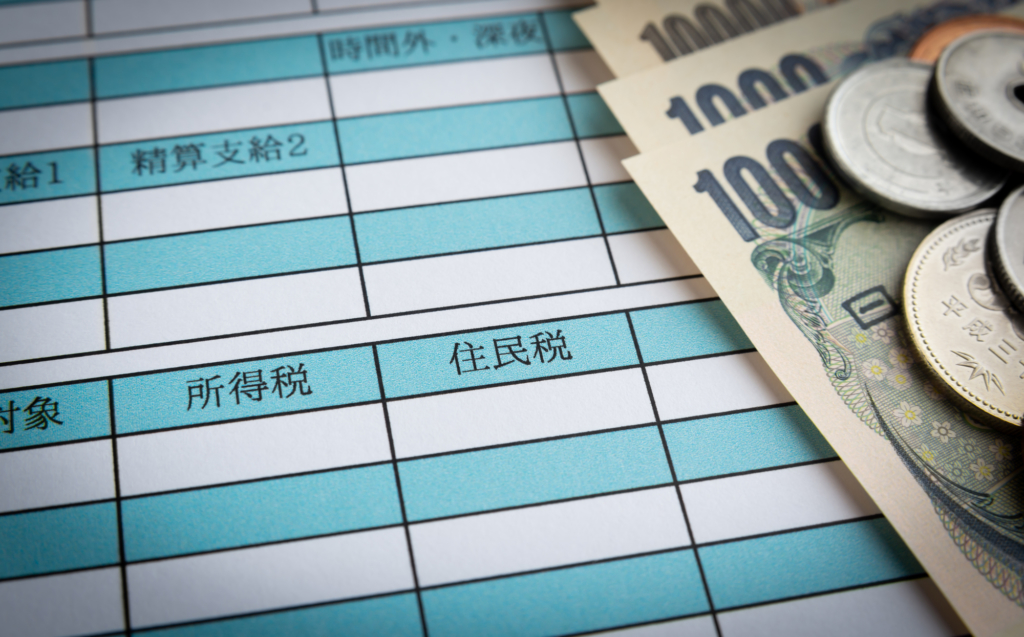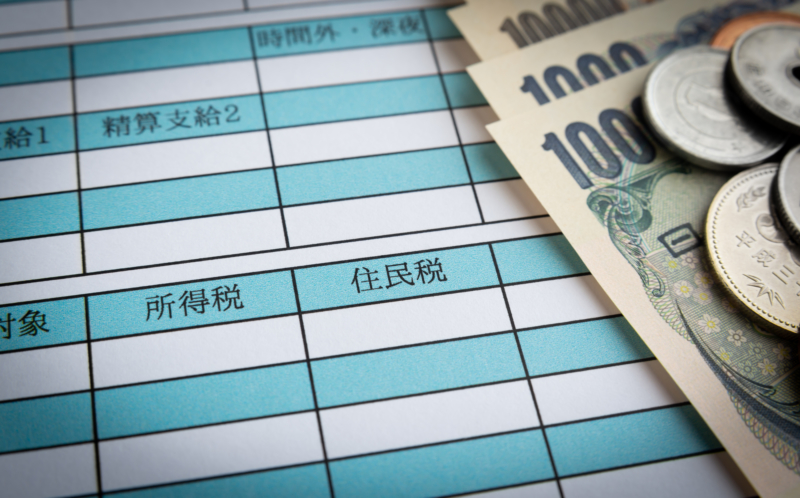According to Japan’s constitution, every Japanese citizen must pay taxes. This also applies to foreigners living in Japan. There are many kinds of taxes, but the ones that foreign residents should know about are income tax, resident tax, inheritance tax, corporation tax, and business tax. In this article, we’ll discuss resident tax, as it’s one of the most important taxes that people working at Japanese corporations need to know about.
What Is Resident Tax?

Resident Tax
There are 50 kinds of taxes in Japan, including national tax which is paid to the national government, the local tax paid to local municipalities, the direct tax paid directly by taxpayers, and the corresponding indirect tax.
Resident tax is based on a person’s income and is paid to the local government by everyone, no matter their nationality. It’s mainly used to pay for government services, which is why it’s subdivided into prefectural inhabitant tax and municipal inhabitant tax. Technically, resident tax also includes corporate inhabitant tax (which is paid by corporations), but in this article, we’ll focus on individual resident tax.
Who Has to Pay Resident Tax?
Anyone working in Japan, even foreigners, whose income exceeds a certain amount of money has to pay resident tax. They also have to have been living in Japan for more than a year as of January 1st, which makes them a legal “resident.” The term includes permanent residents (people with Japanese citizenship, people who’ve lived in Japan for the past 10 years, or people whose total time living in Japan amounts to 5 years or more) as well as non-permanent residents (people without Japanese citizenship, people who’ve lived in Japan for less than 10 years, or people whose total time living in Japan amounts to fewer than 5 years).
Resident tax is levied on residents on January 1st by local municipalities and is based on the residents’ income from the previous year. That’s why those who weren’t living in Japan the previous year, foreigners without a permanent Japanese address, or students with no income do not have to pay resident tax. However, even if you leave Japan after January 2nd but still earned an income the previous year, you will have to pay resident tax.
How Does One Pay Resident Tax?
There are two ways to pay resident tax: the “special collection,” which is money deducted from your salary each month, and the “ordinary collection” that is paid by the individual. Whenever a company pays an employee above a set amount of money, they are obligated to deduct resident tax from their salary. That’s why office and temp workers don’t have to pay the tax themselves.
Resident tax is calculated by local governments based on a person’s income from the previous year and reported to their employers so that they know how much to deduct from the employee’s pay. Companies normally deduct the tax from a person’s salary each month from June to May of the following year.
Self-employed and currently unemployed people also have to pay resident tax via ordinary collection based on a notice sent to them by their local municipality if they earned an income the previous year. The payment can be made all at once or in four installments spread throughout the year, and can be paid at either at the post office, a financial institution of their choice, or even the convenience store.
Resident Tax FAQ

Let’s talk a little bit more about resident tax.
Q1: What time frame is the resident tax calculation based on?
A: Income earned between January 1st and December 31st.
Q2: How is resident tax calculated?
A: On January 1st, your local municipality looks at your income earned between January 1st and December 31st of the previous year, calculates your per capita portion and income-based portion, and combines them to come up with your resident tax amount.
Income-based Portion (taxable income* from last year x 10% tax rate)
+
Per Capita Portion (flat-rate)
The Income-based Portion is based on a person’s income and is taxed at a rate of 10% (4% for prefectural inhabitant tax and 6% for municipal inhabitant tax). However, some municipalities may set up their own tax rate.
The Per Capita Portion is unrelated to a person’s income. It’s a flat rate of 5,000 yen (1,500 yen for prefectural inhabitant tax and 3,500 yen for municipal inhabitant tax.) Note: between 2014 and 2023, to aid with local governments’ disaster prevention countermeasures, an additional 1,000 yen will be levied on taxpayers to be split evenly among prefectural and municipal inhabitant taxes.)
* How to calculate taxable income:
Taxable income = Income – Amount deducted from income (employment income deduction, expenses) – personal income deductions**
** In terms of resident tax, there are thirteen possible income deductions, including basic deduction, deduction for dependents, social insurance premium deduction, or life insurance premium deduction. Not everyone qualifies for income deductions. You have to meet certain requirements. For more information, check your local government’s official website.
Q3: Who calculates resident tax?
A: Resident tax is calculated by your local municipal government office. Once it’s been calculated, the information will be sent to your company around April/May. If you’re self-employed, you will receive the information either at your office or home address. Resident tax includes prefectural inhabitant tax and municipal inhabitant tax, so taxpayers don’t have to pay resident tax directly to the prefectural government.
Q4: How much is resident tax usually?
A: It’s based on your yearly income, but we’ve outlined some rough estimates below:
* Calculated for single people without spouses or dependents, so the only income deduction is the basic deduction.
| Yearly Income | Yearly Amount | Monthly Amount |
|---|---|---|
| 2,000,000 yen | 94,000 yen | 7,833 yen |
| 3,000,000 yen | 164,000 yen | 13,666 yen |
| 4,000,000 yen | 238,000 yen | 19,833 yen |
| 5,000,000 yen | 318,000 yen | 26,500 yen |
Are You Paying Too Much? Tax Deductions and Exemptions

In Japan, all income, whether domestic or foreign, is taxed. However, if you’ve paid taxes on foreign income abroad, you cannot be taxed for it again in Japan, and that amount can be deducted from your resident tax.
1. Foreign Tax Credit*
If you’ve earned an income from a foreign salary or dividends and have paid all the proper income taxes and individual resident taxes in that country, then you can deduct that tax amount from your Japanese income tax. If you’ve only paid income tax abroad and you haven’t gotten it back, then you can also deduct that amount from your resident tax. All of this should be reported on your tax return form (確定申告書).
* For more information, visit the National Tax Administration Agency’s website.
2. Tax Conventions
Japan has signed tax conventions with nearly every other country, and parts of it cover resident tax. If you’re a trainee, apprentice, or meet certain qualifications, then you can file an Application Form for Income Tax Convention (租税条約に関する届出書) at a tax office or your local government office, which might result in a lower or even waived resident tax. The notification has to be filed before March 15.
* For more information, visit the National Tax Administration Agency’s website.
When Do You Have to Pay Resident Tax?

There are circumstances when you don’t have to pay resident tax, such as if you’re a single office worker and you’ve made less than 1,000,000 yen the previous year (the exact amount may differ depending on the region). However, if you’ve made more than that, even if it was from temp work, then you have to pay resident tax, which is usually handled by your employer, so you don’t really have to do anything yourself. Moreover, if you’ve made more than 1,030,000 yen before withholding, then you’ll also have to file a tax return form. Additionally, if you’re working two or more part-time jobs and your combined yearly income is more than 1,000,000 yen, even if each job pays less than that, then you’ll have to pay resident tax.
Things to Be Careful of When Paying Resident Tax
If a person pays the resident tax via “special collection” but later quits their company, then the remaining amount will be paid via “ordinary collection,” although some companies take out the outstanding amount from your last paycheck or severance money. So, if you’re planning to quit your job, you should first find out what will happen with your resident tax.
Additionally, if you’re planning to leave Japan and cannot pay all of your resident tax beforehand, you’ll have to file a notice with your local government office appointing a “tax administrator” who’ll be authorized to pay your resident tax in your stead. Be careful because foreigners who neglect to pay their resident tax might have trouble with renewing their visas later!
And that was our explanation of Japan’s resident tax! We hope that this article has helped you understand the tax better, and maybe it will even save you some money come next tax season.
If you want to give feedback on any of our articles, you have an idea that you’d really like to see come to life, or you just have a question on Japan, hit us up on our Facebook!
The information in this article is accurate at the time of publication.

